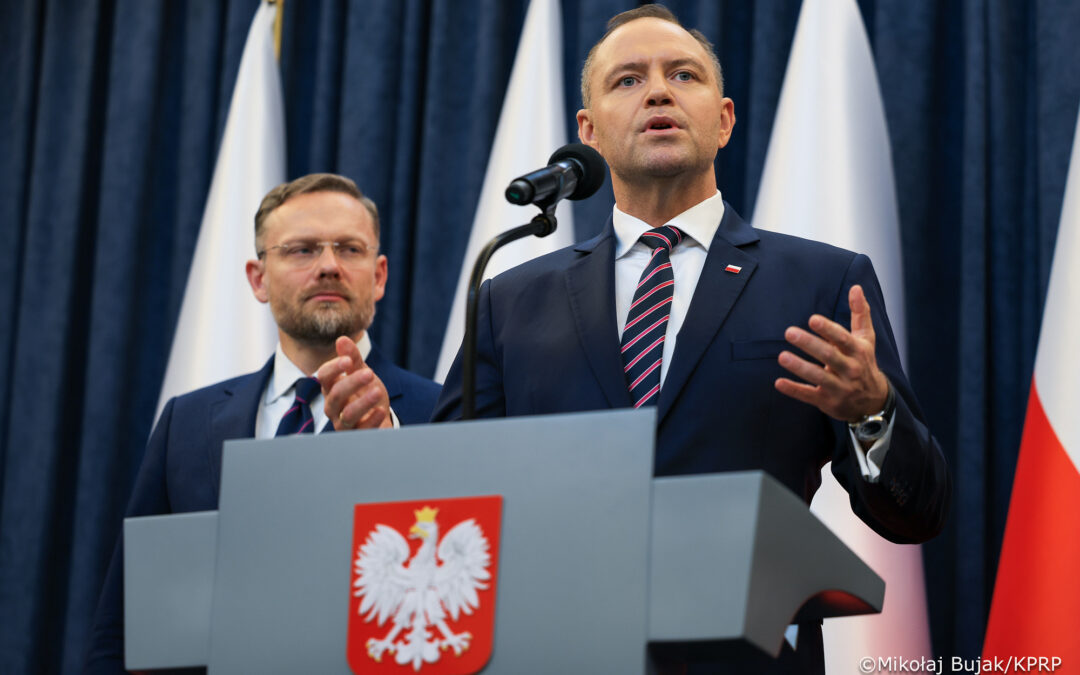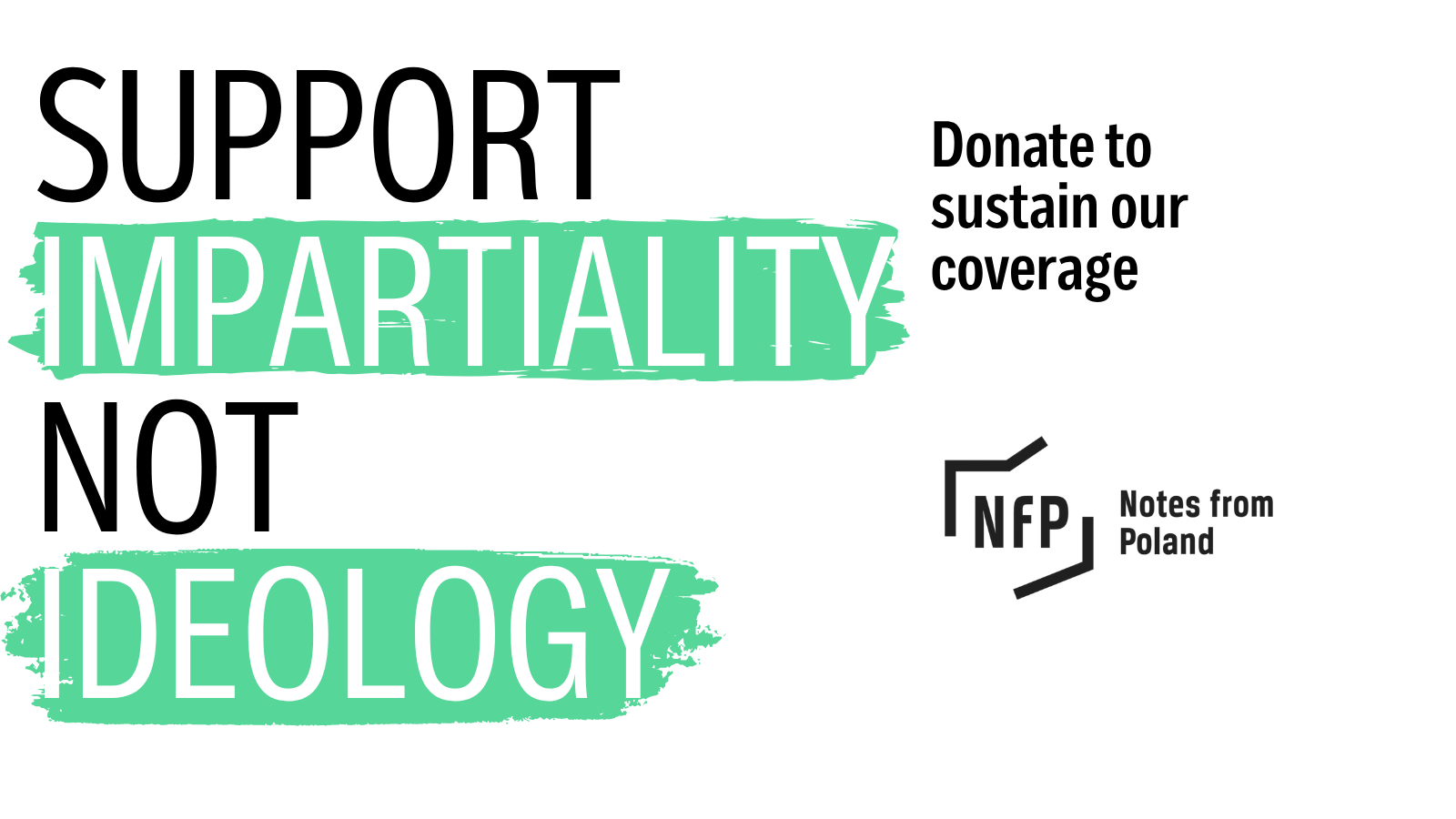Keep our news free from ads and paywalls by making a donation to support our work!

Notes from Poland is run by a small editorial team and is published by an independent, non-profit foundation that is funded through donations from our readers. We cannot do what we do without your support.
Opposition-aligned President Karol Nawrocki has announced that he will not sign off on 46 nominations of judges who he says are supportive of the unconstitutional actions of the government.
The move marks a further escalation in the dispute over the rule of law between the current government and figures associated with the former ruling Law and Justice (PiS) party, with which Nawrocki is aligned.
The government’s spokesman has condemned the president’s decision as a “usurpation of power and attempt to undermine the justice system”.
Prezydent RP @NawrockiKn: Każdy sędzia nominowany przez Prezydenta RP jest sędzią RP. Prerogatywą prezydenta jest nominowanie, ale może on także tych nominacji odmówić. Korzystam dziś z tego prawa – odmawiam nominacji 46 sędziów. To już nie tylko słowny sygnał, ale konkretna…
— Kancelaria Prezydenta RP (@prezydentpl) November 12, 2025
In Poland, it is the exclusive prerogative of the president to appoint judges, and on Wednesday afternoon Nawrocki announced that he would “exercise [my] right to refuse the nomination of 46 judges”.
“I will not grant nominations or promotions to those judges who question the constitutional and legal order of the republic, who listen to the malicious whispers of the justice minister, Waldemar Żurek, who encourages judges to question the constitutional and legal order of Poland,” he explained.
“Over the next five years [the remainder of Nawrocki’s term], no judge who questions the constitutional powers of the president, the Polish constitution [or] the Polish legal system can expect either a promotion or a nomination,” added the president, noting that he had made such a promise when taking office in August.
Nawrocki’s chancellery has not yet released a list of the judges whose nominations he is rejecting. However, the president suggested that they are “judges [who have] questioned the status of other judges”. That refers to an issue at the heart of Poland’s rule-of-law crisis.
The former PiS government overhauled the National Council of the Judiciary (KRS), the body responsible for nominating judges, to bring it under political control. A number of Polish and European court rulings have found that those actions rendered the KRS illegitimate.
As a consequence, around 2,500 judges nominated by the reformed KRS and appointed by former PiS-aligned President Andrzej Duda (often referred to as “neo-judges”) are also regarded as illegitimate by many of their colleagues (so-called “old judges”) as well as the current government.
Fifteen months since the change of government, Poland's rule-of-law crisis continues – indeed, many Poles think the situation has got worse.@J_Jaraczewski explains the roots of the crisis, what its impact has been, and how it might be resolved https://t.co/7KOCURV3dU
— Notes from Poland 🇵🇱 (@notesfrompoland) March 17, 2025
Nawrocki said that the fact some judges question the status of others harms “our citizens, ordinary people, who cannot receive a fair court judgment that complies with Polish law”.
He pointed to the overturning of convictions against two murderers and a man who raped an underage girl because they had been issued by “neo-judges”.
Further explaining the president’s decision, his chief of staff, Zbigniew Bogucki, said that the rejected nominees had been involved in “quasi-political or outright political activities”, including “questioning laws passed by parliament and signed by the president”.
Bogucki noted that the president’s decision related to the promotion of judges to higher positions. He said that they would continue to adjudicate in their current positions.
The justice ministry has presented a bill that would overhaul one of the institutions at the heart of Poland's rule-of-law crisis.
It wants to ensure that the body responsible for nominating judges is made independent of political control https://t.co/9Cilwx6e46
— Notes from Poland 🇵🇱 (@notesfrompoland) November 6, 2025
The president’s announcement was immediately condemned by government spokesman Adam Szłapka, who called it a “usurpation and attempt to undermine the justice system in Poland, deepening the chaos that has been inflicted on us by [PiS]…and President Andrzej Duda”
Subsequently, Żurek announced that he would wait to see the list of which nominations Nawrocki was rejecting and for what reason. However, he said that, from what the president had said today, it appeared that his decision was unconstitutional.
“The constitution clearly states that the president does not decide who is a judge, but rather hands over the nomination,” said Żurek, quoted by news website Onet.
Regarding Nawrocki’s remarks about judges “listening to malicious whispers”, Żurek said that it was reminiscent of the rhetoric used by Poland’s former communist regime.
Szłapka: oświadczenie prezydenta o odmowie nominacji 46 sędziów świadczy o próbie uzurpacji uprawnień#PAPInformacje pic.twitter.com/mlWLyez9WS
— PAP (@PAPinformacje) November 12, 2025
In September, the justice ministry presented draft plans for how to regulate the status of judges appointed by the KRS after it was overhauled by PiS. Earlier this month, it also put forward a bill to reform the KRS so that it is once again independent of political influence.
However, even if both bills are approved by parliament, where the government has a majority, they appear likely to be vetoed by Nawrocki.
In an interview on Tuesday with broadcaster wPolsce24, the president said that, if he and the government are unable to reach an agreement on how to resolve the rule-of-law crisis, he would submit a motion for a national referendum to be held on the issue.
TYLKO U NAS. Prezydent @NawrockiKn mówi "dość" chaosowi w sądownictwie i wskazuje na możliwe referendum: "Tak żyć po prostu nie można!"
— wPolityce.pl (@wPolityce_pl) November 11, 2025

Notes from Poland is run by a small editorial team and published by an independent, non-profit foundation that is funded through donations from our readers. We cannot do what we do without your support.
Main image credit: Mikołaj Bujak/KPRP

Daniel Tilles is editor-in-chief of Notes from Poland. He has written on Polish affairs for a wide range of publications, including Foreign Policy, POLITICO Europe, EUobserver and Dziennik Gazeta Prawna.




















